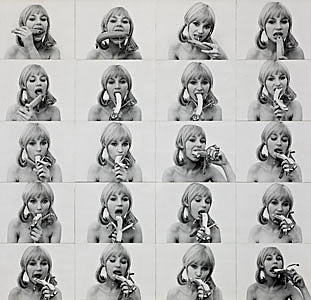
Born in 1937 in Zywiec (PL)
Lives and works in Wroclaw (PL)

1972
Black and white photograph, Diptych
100 x 100 cm chacune
Year of Purchase: 2003
It is not her and there is something beyond that. So, it is really nor her? This question comes out regularly when discussing the early work of eminent early Polish feminist artist Natalia Lach-Lachowicz. It is not her, indeed. Ela M., Anna D., Danuta N. and other women who acted and posed in works Consumer Art and Post-Consumer Art by Natalia Lach-Lachowicz in the beginning of the 1970s are nearly anonymous, known only to the art circles of Wroclaw of that time. It turned to be even more confusing, since the image Ela M. – at first glance blond naiveté – was used by the artist for her project at the IX Paris Biennale exhibition in Musée d’Art Moderne de la Ville de Paris in 1975 to construct the persona, known to the public as Natalia LL. The persona was equipped also with the date of birth taken from Natalia’s brother. Earlier in 1971 the framework of installation Natalia LL, the last name of Natalia was reduced for the first time into two initial capital letters and it remains her official art name until now.1 Half real half fictional, the Persona for long was the artist’s only identity and trademark, although later the artist decided to work with her own face and body. This use of avatar instead of the face of the artist appears to be a key to understanding the theoretical position behind her art. It is a form of reduction, both on the level of producing and reception.
It has been discussed numerous times, with the variety of often oppositional conclusions, that the content of these works strikes the viewer with expressive although symbolically recollected sexual content. Female characters who played in different, both video and photographic versions of the piece, playfully eat ba-nanas, the variety of sausages and cherries, when in the following series of Post-Consumer Art they eat jelly and pudding no less suggestive way, allowing it to drip from their mouth and licking it up with irresistible pleasure. And so what? Good question, since it seems to be obvious that they are women who are the rulers here and the male gaze has nothing to do with it. The artist, at the time when the works from the series were made, never declared any will of dealing with sex as a subject of art or to adopt a feminist critical position. Her power within this context is laughter and the denial of being dependent of sexual symbolic.2
Moreover, LL in her declarative texts plays with imagination and expectation of the viewer. No, this is not to cause arousal, it is just an objective registration of everyday life she declares in her artistic manifestos. Connected with conceptual scene of Wroclaw, Natalia LL was the believer of permanent registration of human activities. The Intimate Sphere, another work of that time is based on full photographic registration of sexual intercourse. Sex, she says, is like eating, sleeping and any other human activity.
But there is a seduction hidden underneath the alluring visual display. The more attractive and narrative the visual is, the more Natalia LL forces us to look behind it and entangle with art itself. Fully focused on the language of art, conceptual thinking and registration as a form of practice her practice albeit can be read also as a meta-narrative on art itself. Natalia wants art to liberate from being defined, what is represented in Consumer Art. As she states in her ‘Categorical Statements from the Sphere of Post-consumer Art’: ‘Art becomes post-consumer art only when it has been defined by art.’ 3 Her demand is the opposite to the represented. She is expecting the viewer to target beyond it; which seems to be still not such an easy matter, when you look at it.
Aneta Szylak
1 See: Texty. Natalia LL, Galeria Bielska BWA, Bielsko-Biala, 2004, pp. 503-504.
2 This aspect is being discussed by Gislind Nabakowski: Zwei Mythen werden mit vergnügen Preisgegeben, Heute Kunst, February-March 1975, n˚ 9, Düsseldorf, reprinted in Texty. Natalia LL, Galeria Bielska BWA, Bielsko-Biala, 2004.
3 op. cit. p. 313.